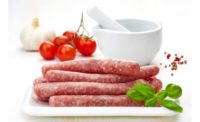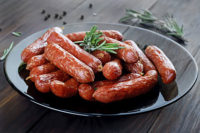Casings: a Sausage's Best Friend
Casings: a Sausage’s Best Friend
By Joshua Lipsky, Senior Editor
Today’s sausage casings aren’t just a means to enclose a product; they do a lot more!
Sausage processors demand a lot from their casings. Besides simply enclosing the sausage, casings must provide a way for the product to differentiate itself from its competition.
Industry thinking is still divided as to which type of casing is superior as different casings each have their own set of benefits. However, John Hartford’s seminal folk classic “Natural To Be Gone” seems to have foreshadowed the casing industry as more sausage processors are moving away from natural casings. Fibrous, plastic, and vegetable-based casings have taken casings into new directions — and sausage producers couldn’t be happier.
Fibrous is fantastic
Fibrous casing’s popularity continues to rise as sausage processors look for casings that boast variable sizes and do not break apart. Today’s fibrous casings feature uniform pieces for larger diameter sausages, and they have enabled the sausage industry to automate many of its production practices. At the forefront of the fibrous casing revolution are two Illinois-based companies, Lisle’s Teepak and Oak Brook’s Inovpack Vector.
It’s been more than 75 years since Teepak introduced its cellulose casings that could be automatically filled and linked. Teepak now produces fibrous casings that are designed to increase sausage producers' productivity as well as increase their product portfolios. Teepak’s latest offerings, its Smok-E, Smok-E Mesquite, Smok-E CMVP, Roast-E, and Versatile Caramel casings, are designed to improve productivity by reducing cook cycles. Using a smoke casing, sausages can be cooked in the smokehouse with increased humidity levels that ultimately result in reduced cook cycles. With shorter cook cycles, sausage retains more of its moisture and weight, so sausages cooked at a higher humidity with a shorter cook cycle result in a 2 percent or more cooking-yield improvement. There are other operational savings resulting from using Teepak’s coated casings. The less time products spend in the smokehouse, the less energy is used. And with shorter cook cycles, smokehouse capacities ultimately improve, so sausage producers can avoid future capital expenses tied into purchasing additional smokehouses.
While Teepak’s fibrous casings offer production benefits, they also enable sausage producers to create new products simply by switching casings. By changing to a different Smok-E or Caramel casing, new color and flavor combinations can be implemented. A sausage producer can simply expand their product portfolio to feature a hickory, mesquite, or applewood-flavored product without introducing any new ingredients or cooking methods.
Inovpack Vector is also acutely aware of the importance of casing flavor and visual appeal. Inovpack Vector’s Enhance SmokeKote and ColorKote casings boast flavorful, smooth, natural surface colors, and flavors. Its latest fibrous casing line, the Vector Enhance series, features high cook yields, natural colors, clean labeling (resulting from all-natural smoke ingredients), and excellent barrier properties.
Perfect plastic
Gaining popularity are plastic casings, which give processors a variety of different flavor and color choices. In addition to uniform weights and link characteristics, today’s premium plastic sausage casings boast radical colors and distinctive flavors.
Brazil’s Unipac made waves when it introduced its line of plastic casings that are available in 45 colors and come either with a matte or high-gloss finish.
“The high-print definition today could never be achieved on the fibrous casings that previously dominated the industry,” relays Ralph Schuster, director of sales and marketing for Unipac. In addition to the rainbow of colors available, Unipac’s plastic casings feature “easy fill” technology that provides greater elasticity without compromising any taste or texture characteristics.
Down in Texas, DeWied offers its Flavo-Fresh Color casings dyed in a variety of different “smoke tones” designed to prevent smoked sausages from losing its color while in the meat case. DeWied’s ADVA plastic casings eliminate the vinegar purge often associated with cellulose casings. “Vinegar purge is the ugly, unappetizing, brown liquid often seen in packages of fresh chorizo,” explains Fred Opper, vice president of marketing for DeWied. “ADVA also lengthens product shelf life and eliminates the need for over-packaging in vacuum pouches or over-wrapped trays, saving production costs.”
Go veggie
A radically new kind of casing, vegetable-based, is rapidly gaining a following. Fayetteville, AR-based VegiCase’s vegetable-based casings go on in a gel form and are then “fixed” to the sausage in a brine bath. Because of the casing's cross-link characteristics, the casing does not break or peal during cooking over time. Other benefits include: low casing-cost per pound of meat (between 4 and 10 cents per pound); neutral taste; cooks like natural casing; eligible for kosher and Halal; production capacity up to 2,600 pounds per hour; and sausage producers can add flavor and color profiles in the casing mix.
Sausage producers have a ton of variables they can alter to change the taste, appearance, and texture of their products. In addition to everything they can do to change the contents of the sausage itself, they can also dramatically change the eating properties of their product by simply changing the casing.
Sausage producers have never had it so easy, and consumers have never had it so good! NP
Casing suppliers contributing to this feature include:
• DeWied, phone (800) 992-5600, or visit www.dewied.com
• Inovpack Vector, phone (888) 227-4647, or visit www.inovpackvector.com
• Teepak, phone (630) 493-9080, or visit www.teepak.com
• Unipac North America, phone (630) 983-8040 or fax (630) 416-6816
• VegiCase, phone (479) 601-3933, or e-mail kst@bmaster.com
Looking for a reprint of this article?
From high-res PDFs to custom plaques, order your copy today!







